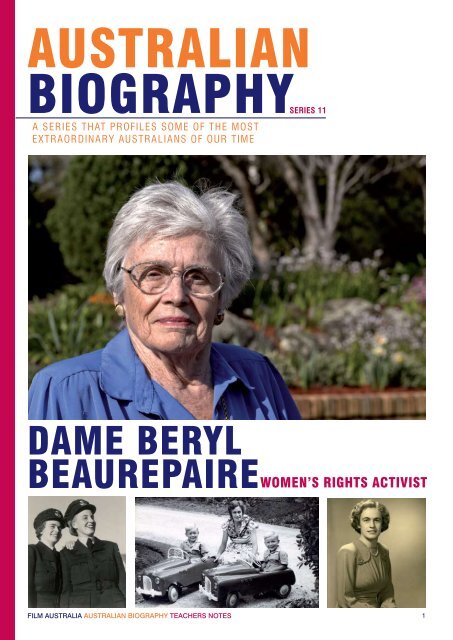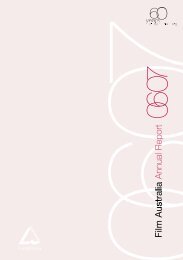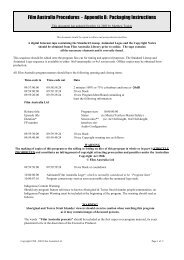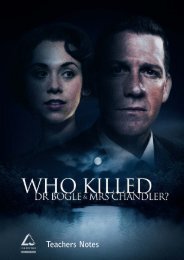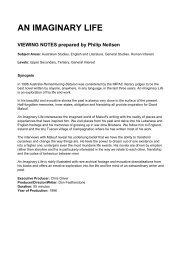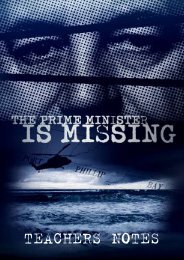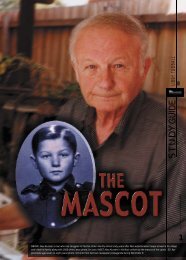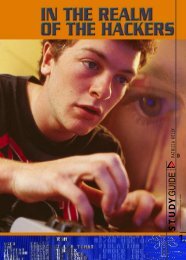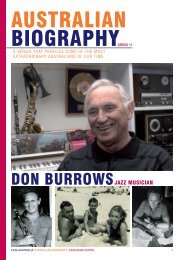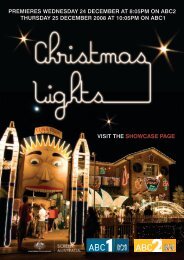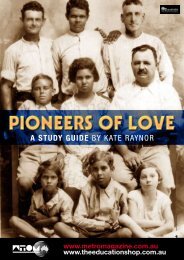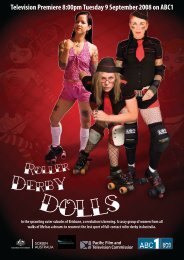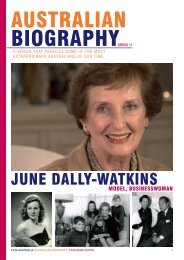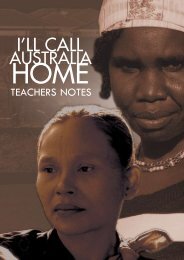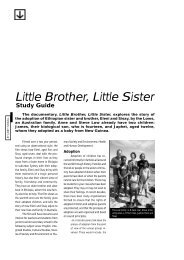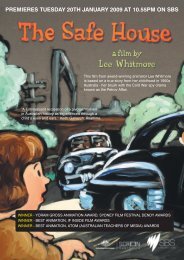DAME BERYL BEAUREPAIRE
DAME BERYL BEAUREPAIRE
DAME BERYL BEAUREPAIRE
Create successful ePaper yourself
Turn your PDF publications into a flip-book with our unique Google optimized e-Paper software.
Australian<br />
Biographyseries 11<br />
A series that profiles some of the most<br />
extraordinary Australians of our time<br />
Dame beryl<br />
beaurepaire<br />
Women’s Rights Activist<br />
film australia australian biography teachers notes 1
Dame beryl<br />
beaurepaire (1923- )<br />
Introduction<br />
This program is an episode of Australian Biography (Series 11) produced under the National Interest Program of Film<br />
Australia. This well-established series profiles some of the most extraordinary Australians of our time. Many have had a major<br />
impact on the nation’s cultural, political and social life. All are remarkable and inspiring people who have reached a stage in<br />
their lives where they can look back and reflect. Through revealing in-depth interviews, they share their stories—of beginnings<br />
and challenges, landmarks and turning points. In so doing, they provide us with an invaluable archival record and a unique<br />
perspective on the roads we, as a country, have travelled.<br />
Synopsis<br />
Born in 1923, women’s activist Dame Beryl Beaurepaire is a pioneering Australian feminist. After serving in the Women’s<br />
Auxiliary Australian Air Force during World War II, she married Ian Beaurepaire of the Olympic Tyre dynasty and became<br />
Melbourne’s Lady Mayoress. At a time when few women were in the workforce, Dame Beryl put her energy into community and<br />
charity work.<br />
Recruited by Sir Robert Menzies to work in the Victorian branch of the Liberal Party, Dame Beryl graduated to the Federal<br />
branch of the party and lobbied successive prime ministers on both sides of politics. A willingness to challenge existing<br />
systems, a sense of social justice, a belief in equal rights and opportunity and a need to contribute to community life led to her<br />
becoming one of the most influential woman in the Federal Liberal Party.<br />
Convener of the first National Women’s Advisory Council and the first woman to be the Chair of the Australian War Memorial,<br />
Dame Beryl has tackled women’s employment, domestic violence, sex discrimination and education issues, among many<br />
others.<br />
Curriculum Links<br />
Threads and activities in this study guide will have interest and relevance from middle to senior secondary and tertiary levels<br />
studying English, Personal Development (especially topic of Gender), Women’s Studies, Society and Environment, Society and<br />
Culture, Politics and Philosophy.<br />
Before watching<br />
The following political figures are mentioned in the program. It will help if you know who they are and their backgrounds: Sir<br />
Robert Menzies, Dame Pattie Menzies, Henry Bolte, Bob Hawke, Malcolm Fraser and John Howard.<br />
After watching<br />
The program opens with Dame Beryl Beaurepaire cautioning us to ‘watch carefully’ lest we become complacent about the<br />
progress women have made in gaining more rights and better conditions.<br />
• Do you believe women can gain more equality with men than what they have now As a class, discuss some of the areas<br />
where women may be able to gain further ground.<br />
Activity<br />
1. Break into pairs and select an area which you feel does not currently provide equal opportunity for women. It may be one of<br />
the areas mentioned just now with the whole class, or it could be an original idea of your own.<br />
2. Find out whether women in the past have tried to change this. How valuable have these pioneer’s efforts been<br />
3. Explain fully why you believe the area you chose is discriminatory and give some examples.<br />
4. Suggest ways you could change the situation to make it more favourable to women.<br />
5. Finally share your ideas with the class.<br />
6. If you are a listener rather than a presenter, jot down arguments against how and why the presenter would change things.<br />
These may not be necessarily your own ideas but rather could reflect society’s arguments.<br />
7. At the end of each presentation, engage in two minutes of debate with the presenters.<br />
At the end of the program, Dame Beryl stresses women’s success does not come easily.<br />
• Do you agree that having confidence in yourself is important Can you think of a time in your life when confidence boosted<br />
your chances<br />
• What else happened for you as a result of your confident attitude<br />
• Do boys have more confidence than girls List reasons that give any person confidence and discuss why this may be so.<br />
• Even though women may not have achieved equality in every area, do you believe that women today ‘are still regarded as<br />
second class citizens’ Give examples to support your answer.<br />
film australia australian biography teachers notes 2
Dame Beryl also speaks out of her own experience when she advises women always to believe in themselves and always<br />
to try.<br />
• Name three events in her life where this philosophy stood by her and she succeeded.<br />
• Do you ever urge yourself on by reassuring yourself ‘Of course I can’ Does it work<br />
Activity<br />
• Think of three scenarios:<br />
1. a competitive situation where only the winner is rewarded<br />
2. a setting where someone who didn’t come close to winning is rewarded for trying<br />
3. a situation where a winner isn’t rewarded at all<br />
Make a list of the benefits and disadvantages for the person in each scenario. Don’t forget to include what the person thinks of<br />
him/herself. Is there ever a situation where personal loss could outweigh personal gain<br />
Influences on Dame Beryl’s life<br />
Family<br />
• Dame Beryl nominates her father as a major life influence.How do you think he influenced her life Why do you consider she<br />
remembers him as giving her ‘courage to do things’<br />
• What influences did her mother have on her Do you consider Beryl’s relationship with her mother influenced her later life<br />
and activities<br />
• What differences do you see between growing up in the 1920s and 30s compared with now Can you suggest reasons for<br />
these disparities<br />
Fintona Girls’ School<br />
Beryl had the good fortune to attend a small, independent day school for girls, where a progressive headmistress (Miss<br />
Cunningham) ran the school.<br />
• Why do you believe Dame Beryl considers Miss Cunningham to be the woman who has ‘had the most influence’ on her life<br />
Name at least three of Dame Beryl’s recollections of her. Discuss why each incident may have affected Beryl’s later life.<br />
• Can you think of a person or event from your own school days that has influenced your life for either good or bad Break<br />
into pairs and discuss how that has shaped your life.<br />
• Do you believe that attending a private school helped form Beryl’s future Support your answer with evidence.<br />
• Would attending a single sex school have awakened her interest in women’s issues and conditions Why/why not<br />
• What do you consider to be the advantages/disadvantages of single sex schools<br />
• Do independent schools benefit their students more than state schools Support your answer with examples.<br />
One of Dame Beryl’s memories is about how the teaching of reproduction, even from a scientist’s viewpoint, created a furore<br />
amongst many parents.<br />
• Is sex education part of your school curriculum Do you think it should it be<br />
Later in the program, sex in schools again becomes an issue. Dame Beryl initially is in favour of condom vending machines<br />
in schools but later says she can see the point of view of headmistresses that such an available point of sale encourages<br />
inappropriate sexual behaviour amongst students.<br />
• Do you think Dame Beryl’s initial stance may have been triggered by a reaction against her own experiences in school To<br />
what degree does our past experience shape our current views<br />
• Do you believe condom machines in schools are a good idea Debate the subject in class.<br />
Fintona’s school motto is Age Quod Agis which is Latin for ‘Do what you do well’.<br />
• Can you find evidence to support the idea that Beryl’s ideas were influenced by the motto<br />
• Does your school motto influence your values or actions in any way<br />
Motherhood<br />
• Being a mother wasn’t an aspiration for Beryl early in her life. Find evidence in the program to support this statement. Look<br />
particularly at the way she describes motherhood.<br />
• How did her parents contribute to her lack of interest in being a mother<br />
• What do you conclude from Dame Beryl’s body language when she is asked how she took to motherhood<br />
At the end of the program Dame Beryl states ‘…that’s a much better achievement than riches or anything else to have your<br />
wonderful family…’<br />
• Ask a number of adults whether family has become more important for them as they got older and if so, why they consider<br />
this happens.<br />
film australia australian biography teachers notes 3
Other Influences<br />
• Suggest other influences which shaped Dame Beryl’s life and examine their roles.<br />
Feminism<br />
Dame Beryl seemed uneasy with the label ‘feminist’ because the word was associated with ‘somebody who was aggressive<br />
and out to down men...’.<br />
• Do you believe the word has gathered negative connotations If so, what do you believe to be the cause<br />
• How would you define a feminist<br />
Dame Beryl believed that she ‘should be able to have equal rights if (she) accepted equal responsibility.’<br />
• Abstaining from the label of feminism, find other ways to describe her convictions.<br />
Service to Women<br />
One of Dame Beryl’s first forays into seeking equality was during the war when she joined the Women’s Auxiliary Australian Air<br />
Force as a meteorologist to help ensure the safety of aircraft, both military and civil.<br />
• The newsreel talks about the job done by ‘women meteorologists’. Why might this term be regarded today as discriminatory<br />
• Do you consider any other part of this news report patronising to women<br />
• Of what value, if any, is this type of archival footage<br />
After enduring gender discrimination in her job and at 19 years of age, Beryl stormed into the office of the Director of the<br />
WAAAF, demanding equal pay for equal work. She wasn’t intimidated by her male colleagues or the rank of her superior.<br />
• Would you expect this response in 1942 from a well brought up young lady What do you think about her actions<br />
• Discuss the reasons you’ve chosen such words to describe what she did.<br />
Sir Frank Beaurepaire<br />
Dame Beryl says she ‘fought for a few things.’ Consider her relationship with her late father-in-law. He headed a business<br />
empire which sold car tyres and because he was an important man, he wanted Beryl to be ‘a social butterfly’. However, she<br />
preferred to learn millinery and paid a deposit on a shop where she would sell hats.<br />
• Why was there ‘uproar’ over the actions of Beryl and her friend What do you believe is the psychological reason behind the<br />
objections which came from both her and her friend’s families<br />
• Does this attitude still exist today<br />
• Why do you think the young women did not go ahead with their plans for the shop Did they cave in to family demands<br />
Was it easier to do so How would you handle a similar situation today<br />
Dame Beryl states that Ian’s father was ‘very domineering’ and yet she ‘took him on’ and triumphed.<br />
• What enabled Sir Frank to have the power to send his son overseas<br />
• What methods did Dame Beryl use to ensure she went with him Does the way she handled this incident in any way<br />
foreshadow her methods of lobbying in later years<br />
• How do you think Sir Frank felt about Beryl Would it have been easy for men to share their power with women, considering<br />
they always had unquestionable authority<br />
Lady Mayoress<br />
Ian’s election to the office of Lord Mayor of the City of Melbourne provided Dame Beryl with opportunities to be either the<br />
socialite or to see situations where her actions could bring about a difference. She chose the latter.<br />
• Do you believe that fighting her own personal battles led her to the point where she felt compelled to fight for the rights of all<br />
women<br />
• Do you think providing breakfast for students was a worthy project for the Lady Mayoress’s Committee Why/why not Are<br />
there still schools today that make breakfast available because some students’ parents don’t have enough money to do so<br />
Who should pay for such services and why<br />
• What do you make of Dame Beryl’s comment that going to all the churches ‘interrupted Ian’s golf’ What more do you learn<br />
about her from this comment<br />
• What do you believe Dame Beryl thought about the Mayoral social responsibilities<br />
• Do you believe all the social activities that we see Dame Beryl involved in during this period (balls, pageants, dinners)<br />
helped her activism for the rights of women, or were they purely fun Give reasons for your answer.<br />
• What do you think about the label ‘Lady Mayoress’. Why would its use today be problematic<br />
• How appropriate would a headline ‘She plans one hairdo a week’ be in today’s papers<br />
Dame Beryl makes comment on how much easier it was for her to raise money because there were so ‘many women who were<br />
not in the paid workforce and they wanted to get involved’.<br />
• Have the incomes of charities suffered because most women now work<br />
• Does this mean society would function better if women did not go out to work Should these factors have any impact on a<br />
woman’s decision to take a job<br />
film australia australian biography teachers notes 4
• What advantages/disadvantages do you see to women filling employment vacancies or running their own businesses Look<br />
at this question from as many viewpoints as possible (employee, employer, society etc)<br />
The incident involving the French Consul in Melbourne was extremely controversial in its day.<br />
• What did Dame Beryl think of the ‘men-only’ dinner ruling How can you tell<br />
• Look at the newspaper headline that we see whilst Dame Beryl is telling about the incident. Why does it refer to Madame<br />
Petrement as M’selle Does this difference alter the message that the paper conveys<br />
• Do you know of any men-only clubs today Why do they survive and do you believe they are a good idea Give reasons for<br />
your answer.<br />
Dame Beryl in Politics<br />
Sir Robert Menzies’ speech introduces this segment.<br />
• What does Robert Menzies mean by ‘in this city we have kept the faith’ and how does this relate the conservatism<br />
• Why does Dame Beryl not like the way she entered politics Why does she then make excuses for herself Can you see this<br />
attitude as part of the way she achieved so much as a lobbyist<br />
Dame Beryl sat on many boards which advised the government, including the Federal Women’s Advisory Committee and then<br />
later she became convener of the National Women’s Advisory Council.<br />
• Explore the role played by the National Women’s Advisory Council and give reasons why you think it’s important or trivial.<br />
• Do these ‘advisory boards’ demean women who don’t have any actual power to pass or debate laws but only to ‘be heard<br />
by the parliament Might they be outmoded<br />
• Can women change the status quo through consensus rather than aggression Are women better at manipulating behind<br />
the scenes to achieve their goals rather than being outspoken and antagonistic Cite examples of both approaches, and<br />
compare the gains of each woman.<br />
• Discuss whether having designated years for different issues, such as International Women’s Year actually works or is it<br />
mere tokenism Support your findings with evidence.<br />
Activity<br />
Research how many women Australia has in parliament and compare the figure with the number of male parliamentarians.<br />
Speculate on reasons that you consider may account for the discrepancy.<br />
Dame Beryl never officially ran for Parliament because she felt she couldn’t toe the party line on every issue and because she<br />
preferred to retain her freedom to say and act as she saw fit.<br />
• What does she mean by ‘toe the party line’<br />
• How many other examples can you find in the film where Dame Beryl cherishes her independence<br />
• Is it better to compromise integrity, give in on some issues but still have a say in parliament or to stay out of it altogether as<br />
Beryl did<br />
• How can you have political power without being a politician<br />
The Council of the Australian War Memorial<br />
When in 1982 a woman was appointed to this committee, many were horrified.<br />
• Are you surprised that previous to Dame Beryl’s appointment, ex-servicewomen did not receive pensions or any form of<br />
recompense given to men who returned from the war<br />
• Why do you think the RSL argued that it ‘was inappropriate for a woman to speak on behalf of our fallen diggers’ when<br />
Dame Beryl was appointed to the position of the committee’s chair in 1985<br />
• If a woman cannot speak on a man’s behalf, why do you believe men think they can speak on women’s behalf Do you think<br />
it is merely tradition which will be broken down over time<br />
Dame Beryl succeeded in getting money for the cause of bringing home the Unknown Soldier.<br />
• Why was Dame Beryl proud of getting money from Bob Hawke<br />
• What evidence can you find that even when she proved she could do a good job as Chairman, many men were still<br />
patronising to her<br />
• Why was the Unknown Soldier brought back to Australia Where was his body previously How important is this type of<br />
ceremony and why<br />
• What is the significance of the music we hear during the ceremony<br />
Final Moments<br />
As the credits roll, we see Dame Dame Beryl strolling with her walker among the flowers at her home.<br />
• Why do you think these images are reserved for the final moments, and not really part of the interview Bring evidence to<br />
your answer.<br />
• How does the music in this scene fit its visual message<br />
film australia australian biography teachers notes 5
References and Further Resources<br />
Australian Women Biographical Entry www.womenaustralia.info/biogs/AWE0365b.htm<br />
Fintona Girls’ School<br />
http://en.wikipedia.org/wiki/Fintona_Girls’_School<br />
Michael McKernan, Beryl Beaurepaire, University of Queensland Press, St Lucia, 1999<br />
Remembrance Day Tradition<br />
www.awm.gov.au/commemoration/remembrance/tradition.htm<br />
Remembrance Day Speech - at the funeral service of the Unknown Australian Soldier, 11 November 1993 (includes audio)<br />
www.awm.gov.au/commemoration/keating.htm<br />
Australian Biography: Dame beryl beaurepaire<br />
A Film Australia National Interest Program<br />
Director/Producer: Rod Freedman<br />
Writer/Interviewer: Robin Hughes<br />
Executive Producer: Mark Hamlyn<br />
Duration: 26 minutes<br />
Year: 2007<br />
Study guide written by Diane O’Flaherty. Photography by Nicholas Sherman and courtesy Dame Beryl Beaurepaire.<br />
NATIONAL INTEREST PROGRAM<br />
For information about Film Australia’s programs, contact:<br />
Film Australia Sales<br />
PO Box 46<br />
Lindfield NSW 2070<br />
tel 02 9413 8634 fax 02 9416 9401<br />
email sales@filmaust.com.au<br />
www.filmaust.com.au<br />
film australia australian biography teachers notes 6


